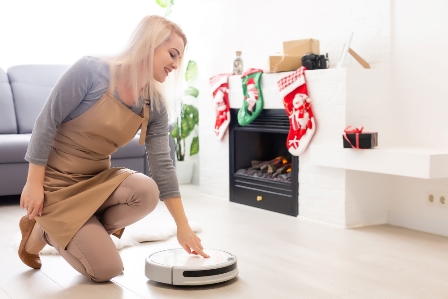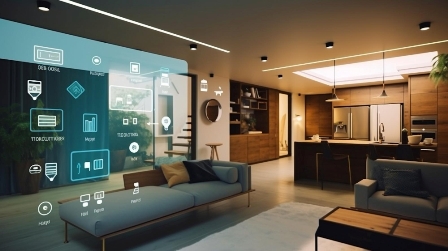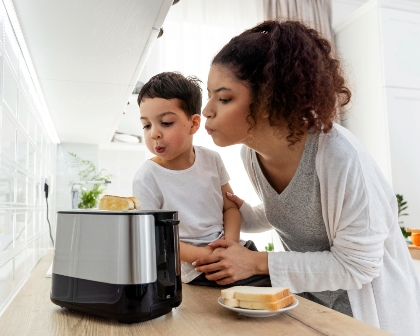In the ever-evolving landscape of modern living, the integration of smart appliances has ushered in a new era of convenience and efficiency. These innovative devices are more than just gadgets; they are life hacks that revolutionize the way we navigate our daily routines. In this article, we will explore how smart appliances are transforming modern living, making our lives easier, more connected, and surprisingly simpler.
The Rise of Smart Appliances
Definition and examples of smart appliances
Before delving into the impact, let’s clarify what we mean by smart appliances. These are devices equipped with advanced technology and connectivity features that enable them to communicate, interact, and be controlled remotely. Examples range from smart refrigerators and washing machines to intelligent thermostats and security systems.
Growing trend and adoption rates
The adoption of smart appliances has seen an exponential rise in recent years. As technology becomes more accessible, consumers are increasingly recognizing the benefits of these devices. The global smart home market is projected to grow significantly, indicating a widespread acceptance of this transformative trend.
How Smart Appliances Simplify Daily Tasks
Kitchen appliances
Imagine a kitchen that understands your culinary preferences, suggests recipes based on available ingredients, and even preheats the oven—all before you step into the room. Smart kitchen appliances are turning this into a reality, simplifying meal preparation and reducing the stress associated with cooking.
Home security systems
Enhanced security is another facet of smart living. With intelligent surveillance systems and doorbell cameras, homeowners can monitor their property in real-time and receive instant alerts. This not only provides peace of mind but also acts as a powerful deterrent to potential intruders.
Smart thermostats and climate control
Regulating the home environment has never been easier. Smart thermostats learn your preferences over time, optimizing energy usage and creating a comfortable ambiance. Whether you’re at home or miles away, you can adjust the temperature with a simple tap on your smartphone.
Enhancing Efficiency and Productivity
Time-saving features
One of the most significant advantages of smart appliances is their ability to save time. Automated processes, such as self-cleaning ovens and robot vacuum cleaners, free up valuable moments that can be redirected towards more meaningful activities.
Automation and remote control capabilities
The power to control your home from anywhere is a game-changer. Smart appliances can be programmed to perform tasks at specific times or triggered remotely. Picture returning to a pre-cooled home on a hot summer day or having your coffee ready as you wake up—these are the perks of automation.
Energy Efficiency and Environmental Impact
Smart appliances and sustainable living
As environmental consciousness grows, smart appliances play a crucial role in promoting sustainability. These devices often come with energy-efficient features, helping reduce overall energy consumption and contributing to a greener lifestyle.
Reduced energy consumption and waste
Smart appliances are designed to optimize resource usage. From energy-efficient lighting systems to water-conserving washing machines, these devices not only benefit the environment but also result in cost savings for users.
Integrating Smart Appliances into Smart Homes
Interconnectivity and compatibility
The beauty of smart living lies in the seamless integration of various devices. Smart appliances can communicate with each other, creating a synchronized ecosystem that enhances overall functionality. This interconnectivity is a cornerstone of the modern smart home.
Voice-activated assistants and smart hubs
The rise of virtual assistants like Alexa and Google Home has further streamlined the interaction with smart appliances. With a simple voice command, users can control and coordinate various devices, turning their homes into intelligent, responsive spaces.
Challenges and Concerns
Privacy and security issues
While the benefits are apparent, the integration of smart appliances raises valid concerns about privacy and security. As these devices collect and transmit data, ensuring robust security measures is essential to protect users from potential breaches.
Initial cost and maintenance considerations
The upfront cost of smart appliances can be a deterrent for some consumers. However, it’s essential to view this as an investment in long-term convenience and efficiency. Additionally, regular maintenance is crucial to ensuring the smooth operation of these advanced devices.
Life Hacks with Smart Appliances
Streamlining morning routines
Smart mirrors that display weather updates and calendar events while you get ready or coffee makers that start brewing as soon as you wake up—these are just a couple of examples of how smart appliances can streamline your morning routine, making it more efficient and enjoyable.
Simplifying meal planning and cooking
From suggesting recipes based on available ingredients to adjusting cooking settings automatically, smart appliances in the kitchen can transform the way you approach meal planning and preparation. Cooking becomes an enjoyable experience, even for those with limited culinary skills.
Maximizing home security
With smart doorbell cameras, motion sensors, and automated locks, home security becomes a breeze. Receive real-time alerts, monitor your property remotely, and ensure the safety of your loved ones—all with the help of intelligent appliances.
The Future of Smart Living
Evolving technologies
The journey of smart living is far from over. As technology continues to advance, we can expect even more sophisticated features and functionalities from smart appliances. The future holds exciting possibilities, from predictive AI to fully autonomous smart homes.
Potential innovations and developments
Innovations in the smart home industry show no signs of slowing down. From eco-friendly designs to enhanced AI capabilities, the continuous evolution of smart appliances promises a future where living is not just convenient but also sustainable and intelligent.
FAQs
Installing smart appliances is generally user-friendly, with most devices offering step-by-step guides. However, it’s crucial to follow manufacturer instructions for optimal performance.
Smart appliances often come with energy-saving features, such as programmable settings, sensors that adjust usage based on need, and the ability to monitor energy consumption.
Users should regularly update device firmware, use strong, unique passwords, and enable two-factor authentication when available to enhance security and protect against potential threats.
Many smart appliances are designed to be compatible with non-smart counterparts. However, full integration may require additional devices or smart hubs.
Despite the initial cost, smart appliances often contribute to long-term savings through energy efficiency, reduced waste, and increased productivity, making them a worthwhile investment.
Conclusion
The integration of smart appliances has undeniably transformed modern living, offering unparalleled convenience, efficiency, and a glimpse into the future of intelligent homes. While challenges exist, the benefits of streamlined routines, enhanced security, and energy efficiency make the journey towards smart living an exciting and worthwhile endeavor.





